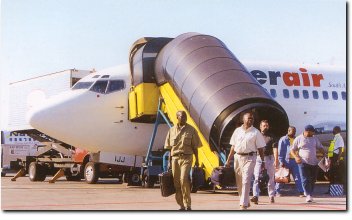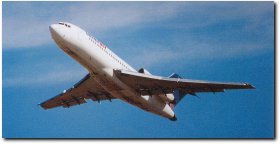|
Strategy
Interair's current fleet consists
of one Boeing 707, one Boeing 727 and two Boeing 737-200s.
 The
airline prides itself in the quality of its services and its
on-time performance. "Our strategy is to try a little bit
harder," says Tokoph. "We offer a superior in-flight
service, such as hot meals, excellent food, complimentary drinks
and more comfort to passengers. We simply try harder. If you look
at our aircraft they are extremely clean and are in impeccable
condition. The
airline prides itself in the quality of its services and its
on-time performance. "Our strategy is to try a little bit
harder," says Tokoph. "We offer a superior in-flight
service, such as hot meals, excellent food, complimentary drinks
and more comfort to passengers. We simply try harder. If you look
at our aircraft they are extremely clean and are in impeccable
condition.
"We really work hard on our
on-time performance. If an aircraft is not pushed back from the
gate 15 minutes after its scheduled departure the pilot has to
submit a report to the operations department explaining why. Our
Mission Statement at Interair South Africa is: 'We try harder'
-and we really mean it."
Interair commenced operations in in
1993 with DeHavilland Dash-7 turboprop aircraft. In March, 1995,
it expanded into international services utilising a leased Boeing 727 aircraft. However, on 18 August, 1997, the airline suspended all services due to financial difficulties.
'I was contacted while travelling abroad and I returned home to South Africa on 26 August and did a quick review of the situation while the liquidators were preparing an inventory of the airline's assets," explains Tokoph. "Realising that an airline cannot stay grounded for long, I took the initiative to recommence services on 29 August to keep from further damaging the credibility of the company. Between 29 August and 15 October, 1997,
I was able to conclude a new shareholding structure and settle previous debts."
To Interair's credit, it is the only airline in South Africa which has gone into liquidation - and survived.
 The country's private airline sector has a track-record of bankruptcies. The rollcall includes Flitestar, Phoenix, Avia and, most recently, Sun Air. The country's private airline sector has a track-record of bankruptcies. The rollcall includes Flitestar, Phoenix, Avia and, most recently, Sun Air.
"Even in Europe and the USA few airlines re-emerge after going into liquidation," says Tokoph. "I am immensely proud to have been able to save Interair in 1997 and to have helped transform it into a leading regional airline in Africa today."
David Tokoph was born in the US and has been involved in aviation from his early days. He became involved in the African aviation market in 1983 when he was running a cargo airline operating flights between points in Europe and many African countries, as
well as internal African cargo flights.
He has also provided passenger and cargo aircraft on "dry" or "wet" leases to operators in several countries in Africa, including Angola, Kenya, Tanzania and South Africa, a service he still provides today.
Tokoph also played an instrumental role in reviving the airline industry in Zambia following the liquidation in December, 1994, of state-owned Zambia Airways. He established Aero Zambia in January, 1995, and built it up into a successful operation.
However, a few years later the airline scaled down its operations as a result of some differences of opinion with certain Government officials. "We elected to hold off further expansion and
investment," says Tokoph. "But Aero Zambia remains a full member of IATA and is still in good standing with this international airline
body".
|